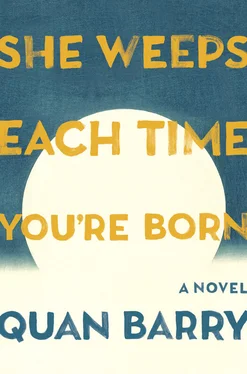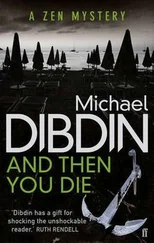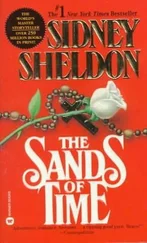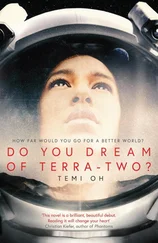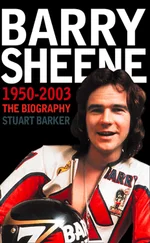Presently in the water the man is floating under the engine, a cosmonaut suspended in the blue. As he disentangles the old fishing net, his blood wafts away in the currents, one part per million, ten miles away the smell of a single drop like a woman’s perfume aerating a room. The man can’t see what he is doing, but there is no need to see. What he has learned the hard way. Life is suffering. Desire is suffering. Attachment is suffering. He doesn’t think about what is riding on his work, the broken boat left drifting at the mercy of pirates, every man, woman, and child’s tongue gradually growing black and parched from lack of water, tongues hardening as if with scales. No future, no past. No sharks knifing toward him out of the darkness. No hunger, no fear, the stomach beginning to eat itself. Everything just present tense, this moment of floating in the sea, cutting the netting out of the motor’s blades, the boat rocking in the water, the silence and the cold and the darkness and the heart beating in the chest.
On the roof of the pilothouse the children spot something speeding over the waves. Uncle, Son calls, his finger pointing to a spot in the future. With his knuckles Duc begins rapping on the bottom of the boat. The black knife skates toward them, the animal with its own sense of the present.
The man resurfaced with the last shreds of the net, blood dripping from his mouth. On board the people waved him on, Sang in her red ao dai , the long sleeves flapping like a flag. Hands were already over the side waiting to pull him up. In the present, the danger of the great dark fin doesn’t register until he sees it. The man turns in the waves and spots the animal cutting straight for him. He claps his hands together in delight and shouts something. Someone translates. Arun says if we hook it in the eye, we could catch it.
A wave sweeps Arun toward the boat. Someone gets a hand on him. Later the others will explain that the thing was too large, its black eyes big as plates. Even if they speared it in the brain, the residual instinct could take over. They didn’t have the space or the proper equipment. There were stories of men losing hands hours after a shark had been hung up by the gills, the massive head tolling in the air, then the sudden snapping of the jaws even after brain death. They were also afraid the shark’s blood would attract more, the waters teeming with teeth. Arun will listen to his friends explain why they let the shark go. When they are done explaining, he will smile and nod the way he does with everything.
Duc climbed back up into the pilothouse as Hai stood winding the cord. There was no guarantee the fishing net hadn’t damaged the engine. There was no way of knowing how long they’d been burning oil. When he was ready, Duc gave the signal. Hai pulled the cord. The first few pulls nothing happened. The doctor’s wife busied herself with her prayer beads. After the third try, Arun took the cord from Hai and laced it up. All eyes were on the engine. Only Rabbit on the pilothouse could see a series of black clouds massing on the horizon. Arun’s grin was almost maniacal. He pulled, the muscles standing out all over his chest. No day but this. The engine kicked on. In the distance the black clouds were already sparking, their underbellies ravenous and flashing.
When a reversal of fortune arrives while traveling on water, do not turn back but continue on. There is nothing to be done. Water is the trickster element. The way it allows you to float, how it seems to carry you along, your physical form brimming with it. Do not be fooled. Water bears the prince as well as the man in rags .
THE FOUR OF THEM WERE SITTING ON TOP OF THE PILOTHOUSE. From time to time a few fat drops fell, but it wasn’t enough to make them come down. Everywhere black clouds whipped over the moon. Tu thought they had another hour before the weather hit. It was the first extended period of time either of them had spent with their children — An on the end with his arm around Son, the scratch on his face still angry and red, Rabbit on the other side of Son with her steely expression, the constellation of freckles on her nose and cheeks. It felt like only yesterday that Tu had pulled her up out of the earth like a carrot, something you harvested from the dirt, the full rabbit moon keeping watch, the scent of honey perfuming the night.
What do you want to know, said An. The clouds were beginning to win. He almost had to shout over the clamoring of the waves, each one tipped with silver. It was bearable, but soon it wouldn’t be. Everything, said Son.
An sat with his memories of the past four years. As soon as he’d heard Buon Me Thuot had fallen, he had walked home through the panicking crowds from the base in Qui Nhon. He took off his uniform along the way, shedding it piece by piece like a snake molting its skin. How he’d left it lying on a low brick wall, first making sure the pockets were empty and there were no identifying marks anywhere on it. As if he could shrug it all off just like that.
The first few weeks after reunification he’d stayed hidden, never leaving home. His neighbors knew, but he’d always been the best of them, the one willing to help someone in need — An always fixing a flat, lending someone money for medicine or schooling, An giving someone the last ripe mango from the fruit bowl beside the altar. There was no fear they’d give him away.
When the posters came out blanketing the city, Phuong saw his name. An had been a captain. Before the Americans had retreated, he’d worked on an American base. The posters said things like TRANSFORMATION and FOR THE GOOD OF SOCIETY. Report with ten days’ worth of food to the old army base to be evaluated. The expectation was that it would be for no more than two weeks. The government didn’t have the resources for mass imprisonments. Phuong packed his bag. Ten days, she said. We are lucky the government recognizes that a boy needs his father. An nodded. There had been talk of blood running in the streets, but it hadn’t happened, and it didn’t look likely now.
He arrived an hour before the main gate opened. There were others already waiting. On base the lines were endless. He was surprised so many had shown up. There was a feeling of optimism in the air. Ten days and they could be done with it, the last half-century. They could finally be a country of brothers. Maybe he had been wrong to oppose the north. Inside he moved from line to line as he was moved up the chain. Each time the official on the other side of the table asked him in a friendly manner if he wanted to be a good citizen. More than you know, he said. An could feel the officers trying not to stare at his mismatched eyes. Toward late afternoon an official passed him a legal pad. Not unkindly, he was told to write out what he’d done during the war, where he’d served, what he’d been in charge of. The more detailed the better, the official said. Dates, names, places, strategies employed.
When his turn came, he was led into an empty room. He was told to sit down and wait. The guard took the legal pad with his account handwritten over seven pages. The only names he’d listed were names everyone knew, generals and such. On page five he admitted he had once shaken hands with McNamara. He was off duty, wearing tennis whites on his way to a match, when the Secretary just happened to be passing by. The American An worked with in Transport and Logistics, a Colonel Wallace, had pointed him out to the Secretary. This is Captain Nguyen. Pleased to meet you, said the Secretary, extending his hand. The Secretary’s grip was beyond perfect, not too hard, not too soft. Afterward An told Phuong there was no way the U.S. wouldn’t win.
The room was windowless. He knew it was one the Americans had used for debriefings. When the fighter pilots came back from their bombing runs, they would come into this room and tell what they had seen, if there had been any new bridges thrown up overnight, any supply routes made obvious by the defoliation. There had been maps and aerial photos taped to these walls. Someone had even hung a photo of Ho Chi Minh on the back of the door with the eyes X-ed out.
Читать дальше
